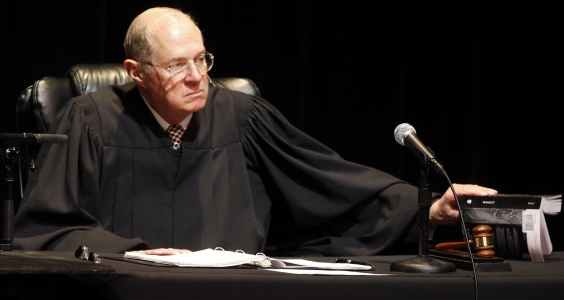


By Rob Schwarzwalder To See Original Article Click Here
Homosexuality is an “Immutable” Characteristic
“Far from seeking to devalue marriage, the petitioners seek it for themselves because of their respect—and need—for its privileges and responsibilities. And their immutable nature dictates that same-sex marriage is their only real path to this profound commitment.” Opinion of the Court, p. 4
Wrong: Homosexuality is NOT an immutable characteristic. This is documented copiously and is demonstrated anecdotally by everyone from Rosaria Butterfield to Chirlane McCray, the wife of New York Mayor Bill DeBlasio.
As reported in an amicus brief for the Family Research Council, an examination of just some of the complaints that have been brought to date challenging state marriage laws reveals that dozens of the plaintiffs seeking to marry someone of the same sex previously were married to someone of the opposite sex. Notwithstanding their (presumed) sexual orientation, they were issued a license to marry. It might be argued that at the time of their previous marriage, they were not homosexual. But that response creates a new problem. If they were heterosexual then, but are homosexual now, then their sexual orientation could not be said to be immutable. – FRC Senior Fellow Peter Sprigg, The Wrong Argument Against Traditional Marriage, April 27, 2015
“Changing Understandings of Marriage”
“The ancient origins of marriage confirm its centrality, but it has not stood in isolation from developments in law and society. The history of marriage is one of both continuity and change. That institution—even as confined to opposite-sex relations—has evolved over time. For example, marriage was once viewed as an arrangement by the couple’s parents based on political, religious, and financial concerns; but by the time of the Nation’s founding it was understood to be a voluntary contract between a man and a woman … Indeed, changed understandings of marriage are characteristic of a Nation where new dimensions of freedom become apparent to new generations, often through perspectives that begin in pleas or protests and then are considered in the political sphere and the judicial process.”Opinion of the Court, pp. 6-7
Wrong: The nature of marriage as the union of one man and one woman has never changed. Legal matters attendant to marriage (women’s property rights, arrangements by parents, etc.) have changed, but the nature of marriage has itself never changed. Kennedy’s argument says, in essence, that because a car now has airbags, it should be called an airplane. Incorrect: It remains a car, even if improvements have been made to its engine, its safety, etc.
These aspects of marriage–the complementarity of male and female, and the irreplaceable role of male-female relations in reproducing the human race–are part of the original order of creation, and are evident to all human beings from the enduring order of nature. These common elements of marriage are at the heart of our civil laws defining and regulating marriage. Therefore, people of all cultures and religions–including those who lack faith in God, Christ, or the Bible–are capable of participating in the institution of marriage. – Andreas Kostenberger, Ph.D., “The Bible’s Teaching on Marriage and Family”
Homosexuality is analogous to race
“When new insight reveals discord between the Constitution’s central protections and a received legal stricture, a claim to liberty must be addressed. Applying these established tenets, the Court has long held the right to marry is protected by the Constitution. In Loving v. Virginia, 388 U. S. 1, 12 (1967), which invalidated bans on interracial unions, a unanimous Court held marriage is ‘one of the vital personal rights essential to the orderly pursuit of happiness by free men’.” Opinion of the Court, p. 8
Wrong: Race is immutable and benign. It is irrelevant to with one’s character or conduct. Homosexuality is not immutable and those who practice same-sex intimacy are engaging in behavior that has intrinsic moral content.
One of the four criteria for defining a classification such as sexual orientation as suspect—which in turn subjects laws targeting that class of people to the highest burden of proof—is that the group in question share an immutable characteristic. The immutability of sexual orientation is hardly a settled matter—just ask Anne Heche (the former partner of celebrity and lesbian Ellen DeGeneres who has now affirmed her heterosexuality). – Margaret Talbot, “Is Sexuality Immutable?” The New Yorker, January 25, 2010
Marriage is a matter of “individual autonomy”
“A first premise of the Court’s relevant precedents is that the right to personal choice regarding marriage is inherent in the concept of individual autonomy.” Opinion of the Court, p. 13
Wrong: While individual autonomy in terms of “personal choice” is “inherent in the concept” of marriage, marriage is not strictly about personal volition. It is a social institution designed for procreation and child-rearing in a complementary household in which a child benefits from the influence of differently-gendered parents.
Marriage is based on the truth that men and women are complementary, the biological fact that reproduction depends on a man and a woman, and the reality that children need a mother and a father. Redefining marriage does not simply expand the existing understanding of marriage; it rejects these truths. Marriage is society’s least restrictive means of ensuring the well-being of children. By encouraging the norms of marriage—monogamy, sexual exclusivity, and permanence—the state strengthens civil society and reduces its own role. The future of this country depends on the future of marriage. – Ryan T. Anderson, “Marriage: What It Is, Why It Matters, and the Consequences of Redefining It”, Heritage Foundation, March 11, 2013
Get all of the latest headlines and news as it happens.
Thank for visiting nationalblackroberegiment.com. In efforts to comply with the new GDPR regulations we have created a Privacy Center for your convenience.